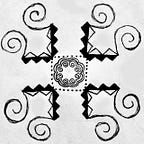The root of our oppression is grounded in the heteropatriarchy that dominates our Hmong community. My lived experiences of the oppression that I have faced have molded me in both good and bad ways, shaping me to be the person that I am today: a feminist, an advocate, a scholar, a writer…
The root of our oppression may resemble those of Hmong womxn around the world, but like all rooted plants that are varied in its colors, textures, and appearance, our lived experiences are distinctly unique based on our intersecting identities. Though our personal stories may differ, we can still (and should) come together in solidarity, because we can empathize and/or sympathezie with the pain, the hurt, the neglect, the abuse, the othering…
The root of our oppression will always be there to remind us where our place is “supposed to be” in the Hmong community. However, the roots of our oppression should not define who we can and cannot be, or what we can and cannot do, and where we can and cannot go. We must take hold of the shovel, dig ourselves out, and replant our roots so that we can thrive higher and farther and unapologetically. In the process, we must not forget to help our sisters who don’t have the power, the resources, or the support network to help themselves. We must not neglect those who navigate life with more intersecting identities — LGBTQ+, immigrant, disabled…
So, in planting our own roots, we must simultaneously learn and unlearn:
- Learn that Hmong womxn deserve agency and to be heard
- Unlearn the victim-blaming mentality
- Learn to say no sometimes for your own self-care
- Unlearn that you deserve(d) whatever came/will come your way
- Learn that you are enough
- Learn that it’s okay to not be cisheterosexual if that isn’t who you are
- Unlearn the heteronormative culture from within and outside of the community
- Learn that sometimes you have to let go of toxic people, even if they are friends or family
As I plant my own roots, I never forget about the root of my and Hmong womxn’s oppression. As Peggy Saika said: “[You need] vision, risk-taking, humility, an ability to listen, make decisions, own mistakes, be self-critical and always, always remember that you’re one person but you’re a part of something bigger, and that it’s not about you.”
